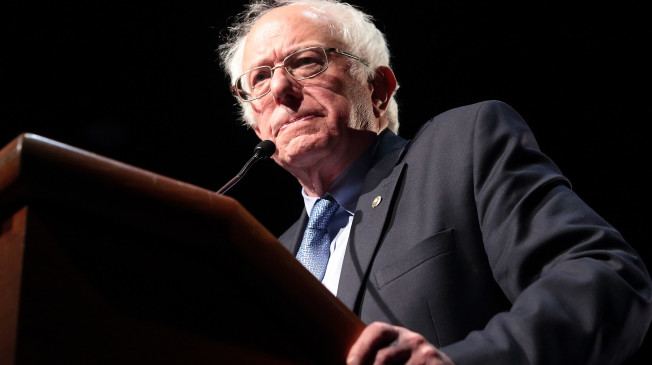By GABRIEL DEBENEDETTI
The Vermont senator is too strong to concede the Democratic race, but too weak to actually win.
Looking at the tough political layout of the five states voting Tuesday, Bernie Sanders’ advisers are expecting him to win the smallest of them (Rhode Island) and hope he can surprise Hillary Clinton in the biggest (Pennsylvania).
But even under that best-case scenario, Sanders will face a familiar problem. His delegate deficit is likely to grow, and the campaign will continue to find itself caught in a unique bind that the Vermont senator and his top aides have chewed over countless times in meetings and conversations in Burlington, Vermont, and Washington, D.C. over the past week: Sanders is too strong to concede, but too weak to win.
Story Continued Below
His online money machine continues to pump along. He still draws thousands to his jam-packed rallies. There’s even the prospect of a series of likely May wins peeking over the horizon.
Yet the path to the Democratic nomination has all but vanished after his 16-point loss in New York last week. Now, with national polls showing him roughly even with the former secretary of state and with $17 million in his pocket as of the beginning of April, Sanders is faced with a series of tricky questions about his place in the race over the next two months — the first of which is how, exactly, to articulate his remaining route to victory.
He hasn’t yet figured out how to answer them.
“[Sanders] is now the rule, not the exception,” said Democratic strategist Joe Trippi, the campaign manager for Howard Dean’s insurgent 2004 campaign – which ended in February of that year. “We’ve just entered the stage now with either super PACs or online fundraising that means the second- or third-place candidate is likely to always have enough money and grassroots support to go to the end. Normally you’d be dead the day after South Carolina [which Sanders lost by 48 points]. He would’ve been under the old funding model.”
“The decision they’ve got to make: What is it that they want to do here?” Trippi added. “You can fight all the way to the convention, or you can do what she did when it became obvious [that Clinton would lose in 2008]: Pull back a little and basically be on the floor, and make the motion to have the convention unanimously vote for Obama.”

For the moment, the Sanders campaign has hesitated to bite on either option, even wavering on how much to attack Clinton, opting instead to see how Tuesday’s results play out.
Choosing to back off too soon would anger or disappoint Sanders’ millions of loyal supporters, his team worries. But deciding to continue fighting could risk damaging the likely Democratic nominee ahead of the general election, though that’s not a concern that weighs heavily on their thinking.
After taking some time to step back and breathe after Sanders’ humbling loss last week — in the description of one senior aide — the senator’s brain trust resumed work, instructed by the candidate to keep assuming that he would continue competing with Clinton in some form or another through the Washington, D.C. primary on June 14, the final scheduled contest.
Even without guidance as to whether Sanders intends to continue trying to take down Clinton or turn into a message candidate at some point, the calculus remains the same, say his senior campaign strategists: as long as Sanders remains mathematically in the race, and as long as he has the money to fund it, there is no reason to exit — forget the questions about Democratic unity.
Thus far, that has meant aides are resuming organizing and buying ads in May and June states like Indiana and California, and continuing preliminary logistical conversations and planning meetings for the July national convention in Philadelphia.
Absent direct marching orders to either intensify or draw back the campaign, Sanders’ strategists are taking their cues from the candidate, who publicly insists in interviews, fundraising emails, and speeches that Clinton’s lead of over 200 pledged delegates is surmountable. And while he maintains that he’s still in the race to win, he has swung between maintaining his standard pre-New York barbs over Clinton’s Wall Street speaking fees, her super PACs, and her Iraq War vote in some campaign speeches to hardly including any mention of her at all in others — sometimes on the same day.
In interviews, Sanders has hesitated to sketch out a specific plan for clawing back Clinton’s delegate lead through the coming states.
“Well, we’re going to have to do — obviously, win big in the number of the primaries and caucuses that yet remain. A poll came out yesterday that has us within striking distance in California, a larger state. I think we can do very well in California,” he told NBC on Saturday, asked to explain his path ahead.
His goalposts have shifted in recent months. When it became clear earlier in April that New York was out of reach, people close to Sanders started suggesting Pennsylvania was the real prize — but even that rhetoric has softened as polls continue to show Clinton holding a lead there.
Sanders’ team thinks he lost ground in Pennsylvania after his wider-than-expected margin of defeat in New York, which it believes got out-sized attention because it was the only state voting last week. And now, while Clinton is set to rally in Philadelphia on Tuesday night, a sign of her camp’s confidence in the state, Sanders is eager to project the image that he’s looking ahead to the states ahead, opting to host an event in West Virginia — where he’s likely to win, but which does not vote until May 10.
That scheduling move belies the postures of many staffers: essentially holding their breath through Tuesday, assuming they’ll get more clarity on the direction forward after Pennsylvania, Maryland, Connecticut, Delaware, and Rhode Island have their say. Bad losses across the board, acknowledged one aide, could create yet another damaging round of press coverage of the type that has riled the Sanders camp in recent weeks — such as a Saturday New York Times story that looked at the Clinton camp’s thinking on selecting a running-mate.
“The media narrative is, every time we lose once, ‘it’s all over.’ And that has more bite as it gets later on [in the process],” groused one high-level staffer, who also bristled at recent news stories hinting at dissension in the campaign ranks after senior strategist Tad Devine and campaign manager Jeff Weaver appeared to project separate messages following New York’s vote.
In the meantime, staffers have turned their attention to the states looming ahead, tentatively sketching out a path predicated on Sanders finishing atop national polls and with over 20 states in his pocket by the convention.
Seeing dim prospects in Kentucky’s closed primary, the campaign is now hoping for a stretch of May wins in Indiana, West Virginia, and Oregon, followed by others like Montana in June. That wouldn’t significantly cut into Clinton’s delegate lead, aides acknowledge, but Sanders seems intent on campaigning through California, the biggest delegate target of all, which votes June 7.
Such a performance, they hope, would help Sanders’ ultimate pitch to super-delegates — top aides note that Clinton-backing Vermont Sen. Patrick Leahy’s office now says he will cast his super-delegate vote for whichever candidate is leading in pledged delegates at the convention, and they were watching closely when Colorado Sen. Michael Bennet was drowned out by Sanders backers chanting “change your vote” at his state’s convention this month.
Still, after a month of working to convince skeptical Democrats that super-delegates would come around to him, even that effort has gotten less of an airing in the last week as no single high-profile party leader has switched from Clinton to Sanders.
On at least one front, the campaign appears to be pressing forward intently even if the candidate himself has dialed back at times: criticizing Clinton.
She is no longer the prime antagonist in each of Sanders’ campaign speeches, though her name does pop up regularly during his appearances on the campaign trail. On Sunday in Providence, for example, it wasn’t until deep into his speech that Sanders lit into her — but he specifically hit her on her lack of support for a carbon tax, not his usual litany of criticisms.
Yet in the campaign’s public press releases that go nationwide, Clinton remains Public Enemy Number One. Sunday’s speech, for example, was billed as “Sanders Challenges Clinton on Climate Change in Rhode Island.”
When NBC asked Sanders on Saturday about his divisions and commonalities with Clinton, he replied, “I think there is a lot that unites us. I think there is a lot that divides us.”
The headline of the campaign’s press release promoting the interview, however, told a slightly different story. It read: “‘There is a Lot that Divides Us’ He Tells Meet the Press.”



















